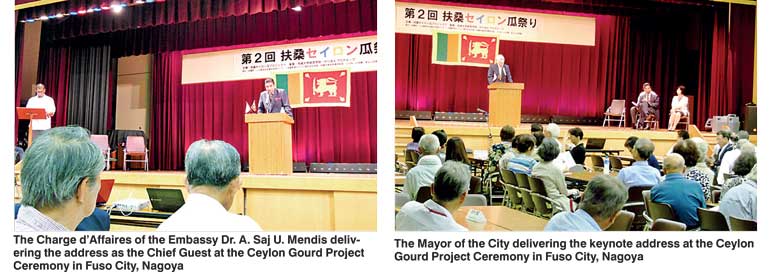Wednesday Feb 25, 2026
Wednesday Feb 25, 2026
Monday, 17 August 2015 00:00 - - {{hitsCtrl.values.hits}}

A gala ceremony was held in the Fuso City of Nagoya in order to promote and educate the benefits and utility of Ceylon Gourd, known popularly as pathola. Over 300 participants attended the said ceremony and the Embassy of Sri Lanka in Tokyo Charge d’ Affaires Dr. A. Saj U. Mendis, delivered the keynote address as the Chief Guest. Professor Ananda Kumara, Senior Professor at Meijo University in Nagoya and at Tokyo Institute of Technology was instrumental and pivotal in proposing and researching the benefits and utility of Ceylon Gourd as well as to educate the Japanese nationals in the prefectures of Achie and Mie as well as in the City of Nagoya. A number of Japanese nationals, today, consume Ceylon Gourd in their regular meals, thus extending publicity to Sri Lanka.
The ceremony was attended by the Mayor, Office of the Honorary Consul General of Sri Lanka in Nagoya, political personalities of the prefecture, senior officials of the city, faculty members of Meijo University and a number of officials from non profit organisations, among others. This project of Ceylon Gourd was proposed only five years ago to the nationals of Japan and, today, it is well known and is publicised in trains, stations and on billboards, among others. The Ceylon Gourd (pathola) is now cultivated in Japan and has emerged as a popular and much liked vegetable.
During the keynote address of Dr. Mendis, he underscored the congenial and cordial bilateral relations between Japan and Sri Lanka. He further added that the two countries established formal diplomatic relations in 1952 but informal relations existed as far back as in the 19th Century. He further added that since 1954, Japan has extended assistance and cooperation to Sri Lanka through overseas development assistance and soft grants and loans in order to develop and advance the economy of Sri Lanka, in all spheres.
Dr. Mendis stated that, during the last couple of years, the relations between the two countries were further strengthened, deepened and elevated to an unprecedented scale, culminating with the historic visit of the Prime Minister of Japan to Sri Lanka in September of last year, after a lapse of two decades. Dr. Mendis also highlighted that the most opportune time is now to commit investments, establish manufacturing and outsourcing facilities and to be engaged commercially with Sri Lanka given the overall economic, social and political profile of the country.
In this context, he underlined that the Noritake Company, which was present in the audience as well as the Head Office is based in Nagoya, committed one of the first foreign direct investments, over four decades ago, in 1972 in Sri Lanka. Today, the products of Noritake have become a household name in the region and are much sought after.
Professor Ananda Kumara during his address stated that over 80 different dishes and recipes could be made by using Ceylon Gourd or pathola. He further added that today the Ceylon Gourd is being included in the curriculum of school publications of Japan. Professor Kumara also stated that a number of sicknesses and diseases could be controlled if not be cured by consuming Ceylon Gourd.
This is one of the first occasions that a Sri Lankan agricultural product had been introduced in Japan and had been increasingly popular amongst the peoples of Japan.
The knowledge and awareness the Japanese nationals received from Ceylon Gourd Project as well as of Sri Lanka, many of them have visited Sri Lanka to witness the Ceylon Gourd and how it is cultivated in Sri Lanka, amongst visiting other places of interest.
The ceremony concluded with luncheon served to all the participants, including a couple of dishes of Ceylon Gourd, as well as souvenirs and brochures of Ceylon Gourd and touristic destinations of Sri Lanka.